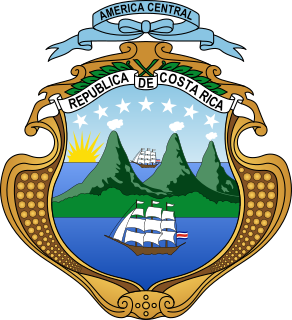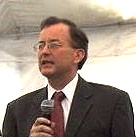
The politics of Costa Rica take place in a framework of a presidential, representative democratic republic, with a multi-party system. Executive power is exercised by the president and his cabinet, and the President of Costa Rica is both the head of state and head of government. Legislative power is vested in the Legislative Assembly. The president and 57 Legislative Assembly deputies are elected for four-year terms. The judiciary operates independent of the executive and the legislature but remains involved in the political process. Costa Rica is a republic with a strong system of constitutional checks and balances. Voting is compulsory in Costa Rica but it is not enforced.

Rodrigo José Ramón Francisco de Jesús Carazo Odio served as President of Costa Rica from 8 May 1978 to 8 May 1982.

Luis Rafael de la Trinidad Otilio Ulate Blanco (1891–1973) served as President of Costa Rica from 1949 to 1953. His French heritage comes from his mother, Ermida Blanco. He never married but had two daughters, Olga Marta Ulate Rojas (1937–2007) and Maria Ermida Ulate Rojas (1938) with Haydee Rojas Smith

Elections in Bolivia gives information on elections and election results in Bolivia.

Ottón Solís Fallas is a Costa Rican politician. He graduated with a Bachelor of Economics from the University of Costa Rica in 1976 and gained a Master's Degree in Economics from the University of Manchester in 1978. He is currently serving his second term as deputy, was a founding member of the Citizens' Action Party, and ran as its three-time presidential candidate. As an academic, he has taught at several universities in the United States and Costa Rica.

Costa Rica held parliamentary and presidential elections on Sunday, 2 February 2014 to elect a new president, two vice presidents, and 57 Legislative Assembly lawmakers. Voting is compulsory in Costa Rica, nevertheless abstentionism was 35 percent in 2006 and 32 percent in 2010. In accordance with Article 132 of the Constitution, the incumbent President, Laura Chinchilla Miranda, was ineligible to run for a second consecutive term.

The Christian Democratic Alliance (ADC) is a political party in the Cartago constituency of Costa Rica. It was founded in 2012, and is led by Mario Redondo Poveda, a former President of Congress and former member of the Social Christian Unity Party. In the general election of 2014, Redondo was elected to the only seat in the Legislative Assembly won by the ADC. Another party of the same name was founded in San José but did not participate in the election. According to its statutes the ADC intends to enrol at national level in the future.

The National Restoration Party is a political party in Costa Rica. It was founded in 2005 by Carlos Avendaño Calvo mostly by dissidents of Costa Rica's historical Christian party, Costa Rican Renewal, after its then only deputy, Carlos Avendaño Calvo, left. Avendaño would successfully return to Congress because of the party from 2010 to 2014. Even though he had personal differences with Justo Orozco, both were able to work together in defending the same agenda, mainly the conservative views of the evangelical community. The party's candidate in the presidential election of 2014 was Avendaño, who received 1.35 percent of the vote.
Juan Manuel Villasuso Estomba is a Costa Rican politician, writer and civil servant. He is a former member of the National Liberation Party and a current member of the Citizens' Action Party.
Henry Mora Jiménez is a Costa Rican economist and political activist. Mora is a member of the 2014-2018 Legislative Assembly of Costa Rica, serving with the Citizens' Action Party. He was the President of the Legislative Assembly of Costa Rica from 2014 to 2015.
Ronald Solís Bolaños is a Costa Rican businessman and politician. He served as a deputy in the Legislative Assembly.
In the election for Head of State of Costa Rica held on 1 January 1829 Juan Mora Fernández is reelected in his position by the majority of Electors. The elections in this period were conducted in two levels, first all Costa Ricans capable of voting according to the Constitution who cast a public vote chose the Electores according to the proportional representation of the population of each location; 11 for San José, 9 for Alajuela, 8 for Cartago, 8 for Heredia, 3 for Escazú, 3 for Ujarrás and 3 for the recently annexed Nicoya. Mora received the unanimous vote of all the provinces except for 2 electoral votes in San José, 1 in Alajuela and 2 in Heredia.
The 1869 Costa Rican presidential election took place while the dictator Jesús Jiménez Zamora was in power after the coup against José María Castro Madriz, whose constitutional term was unable to finish. Jiménez Zamora was the sole candidate, during his government he repressed the press and his political opponents. The 1869 Constitution only allowed men over 25 years old owners of a property that had a value higher than 200 pesos to vote.
After the coup against dictator Jesús Jiménez Zamora on April 27, 1870, and after the brief government of Bruno Carranza Ramírez, Tomás Guardia Gutiérrez succeeded on August 8 and elections were called by the then provisional president Guardia on 8 of May 1872. It was the first time that the presidency was exercised by a military.
The 1876 Costa Rican general election was held on April 2, 1876. Aniceto Esquivel Sáenz was elected president unanimously thanks to the influence of the acting president Tomás Guardia Gutiérrez who practically hand picked him. At that time and according to the Constitution, there were two electoral rounds; first all citizens legally allowed to vote chose electors and then the voters voted for the president.
The 1894 Costa Rican general election was held between 4 and 6 of February and 1 April of that year. The election was quite controversial due to the questionable practices from the government of José Joaquín Rodríguez Zeledón who supported his son-in-law Rafael Yglesias using all sorts of measures to assure his victory, going as far as to even arrest his main rival.
The 1897–1898 Costa Rican general election was held on 12 December of that year under very questionable conditions. Consecutive re-election was forbidden by the Constitution however incumbent president Rafael Yglesias Castro forced a constitutional amendment allowing it to let himself became candidate. He was also the only candidate on that election. Yglesia's main opposition the Republican Party called for abstention.
The 1901–1902 Costa Rican general election occurred under growing political tensions. The authoritarian government of Rafael Yglesias was in direct confrontation with the opposition and had re-elected himself as single-candidate in the previous election by a questionable constitutional reform. The liberal Republican Party represented the most staunch opposition and the country was on the edge of civil war. However, Yglesias managed to negotiate with the moderate branch of the Republicans for a peaceful power exchange.
The 1910 Costa Rican general election was held during the presidency of Cleto González Víquez. This was the last time that indirect elections were held in Costa Rica as for the next one in 1913 the direct vote was implemented. Liberal lawyer Ricardo Jiménez Oreamuno was elected for the first time. Jiménez was very popular in part because of his struggles against the United Fruit Company's abusive operations in the country. Jiménez was proclaimed candidate in the Teatro Variedades during the first Republican National Convention, Costa Rica's first primary election. Jiménez won easily over the other candidate, former president Rafael Yglesias who ruled an authoritarian, though short-lived, regime.










